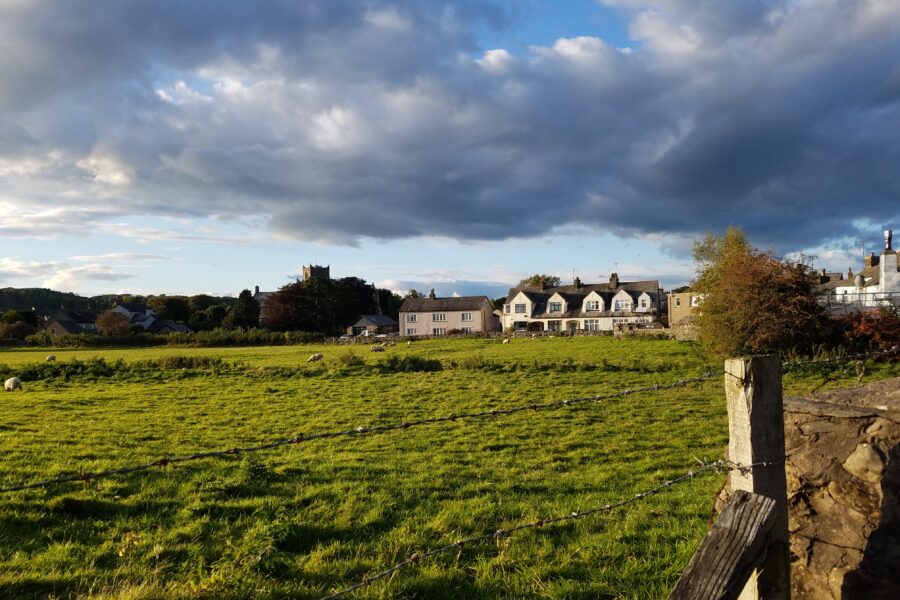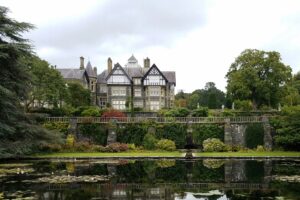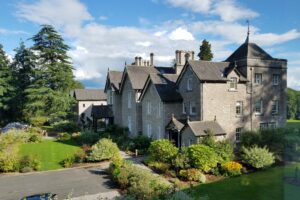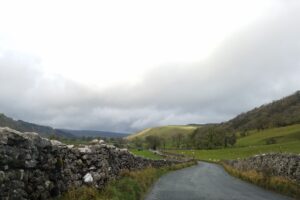We are here for the priory—the 800-year-old priory—which makes me think back to Ken Follett’s Pillars of the Earth and the priory there and the monks and the priests and the wars and the evil and the greed and the good and the ultimate building of a cathedral. We chose this day—Wednesday—because it is the one day of the week when informative tours are given—not just private exploration. So, we retrace the path taken by our car and enter the ancient place of worship. Too early. We can’t seem to nail prompt at all these days; we purchase tickets for later, walking outside into the blustering wind and sunny day. We explore the twisting streets, stumbling across a swollen stream, a kitchen shop, a wine shop, a brewery, a cheese shop, pubs, restaurants, clothing stores, come-throw-away-your-money shops, and personal dwellings.



Michael drops me at the kitchen store. I turn right, rather than left, wandering through a doorway into the shop that sells wine, Hot Wines. Suddenly Michael is at my elbow. We ask the proprietor, David Unsford, if he will be hosting the wine tasting this evening at Merlewood, and he enthusiastically tells us he is, and that it will be a wonderful evening of wine and cheese and friendship and fun.
I mention the white wine I had at the Masons Arms, French Colombard Pays du Gers, and he pulls down a single bottle, sitting on a high shelf that is not the same winery, but the same grape, and he tells me, “This was blended by a friend of mine. It is delicious. Very drinkable.” We promise to return after the priory tour and purchase the bottle when we don’t have to cart it around.
Our priory guide is charming and chatty and talks about distant historical characters as if they are old friends and she knew them personally way back when. Built by Augustinian priests between 1190 –1220, a large part of the priory was destroyed by Cromwell when Henry VIII started his own church in England because he wanted to marry Ann Boleyn, and the Pope in Rome said, “No.” In a rage, Henry began to dissolve all that was left of the Catholic Church across his kingdom.
On my own, I would not have noticed the various areas our guide points out that were defaced by Cromwell and his bands, as well as the varying styles of arches and stone used over the centuries when the priory was built, sacked, saved, rebuilt and added on to. Our forty-five-minute tour stretches to ninety and we are finally bid goodbye.




Before backtracking to buy our bottle of wine we turn our feet toward lunch at the Kings Arms choosing a table tucked in the corner of a far room. Only one other party shares the room with us and they are sitting by the large front window at the opposite end. The mom listens patiently to her little boy who speaks clear as a bell in the tiniest sweetest little voice you have ever heard saying, “Mummy,” about a hundred times—“Mummy look!” “Mummy I’m through.” “ Mummy…” Every sentence, every word is preceded by “Mummy.” Never a hint of a whine. Every time the small child says Mummy, I hear a silent, I love you “Mummy.”
I love that kids here call their Mom’s, Mummy; and that men say lovely without flinching; and if something is good it is brilliant; if something is off it is wonky. It’s all just—lovely.

Michael brings my attention and focus back to the task at hand; he thinks he is being good by ordering a sandwich, until it is delivered and it looks likes it was made with an entire loaf of bread. I try to be good by ordering cream-less tomato soup and a single crispy fishcake topped with a poached egg, and when it is delivered I know I have succeeded. I could do dessert.


As we walk back to the car, bottle of wine in hand, I really want toffee pudding, but I close my eyes when we pass the Cartmel Café—home of the original Sticky Toffee Pudding—and walk on. Being good is not a huge amount of fun.

We are the last couple to slip into the wine tasting, and yet the two chairs remaining are perfect. And the wine tasting promises to be more than we expected. Wines from around the world, each with their own story. Five brilliant artisan cheeses, four made in England: Red Leicester, a runny drippy Brie that tastes of mushrooms and cabbages which sounds terrible but tastes wonderful, a soft creamy Wensleydale cheese and a smoky pale cheddar. The outsider is a Gorgonzola Dolce from the Piedmont region of Italy. The breads that accompany the wide variety of cheese are more artisan confections and baked in Cartmel.

We sit in a large circle, tiny tables in front of each couple, sipping wine, listening to the stories of bread and cheese and wine and David Unsworth’s history. It begins in 1922 when his grandfather purchased a series of buildings in the small medieval village of Cartmel. Cars were coming into their own, and his grandfather decided that what was needed was an automotive repair business. For decades it was a thriving operation, and David says he grew up with grease in his eyes and under his fingernails until finally one day no one was left but him and his architect brother.
Times and needs changed, and the family business began to fail. It was at this point David decided to do an about face. Rather than sell off the buildings and move from a place that was his home he created Unsworth’s Yard, a group of shops—wine, kitchen, artisan cheese, artisan bakery, tea and microbrewery—breathing life not only into the property he owned but into the small village as well. His enthusiasm is infectious and I want the world to come to his doorstep. But not all at once—there would be no room to park.
The woman sitting next to me joins in my rhapsodizing about the cheese and the bread we are eating, and David’s enthusiasm for the small producers of wine he has discovered. We love the wine, and we love the cheese. Future hopes are dashed when she tells me, “You could go to the store and buy this same type of cheese, but it wouldn’t be anything like this.” And I thought I’d made new discoveries. I think I have to try anyway.














Leave a Reply
Your email is safe with us.